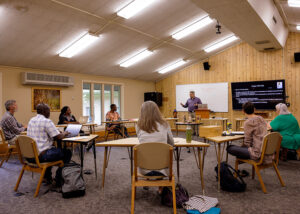Winston Churchill, Great Britain’s Second-World-War-era prime minister, famously said, “Never let a good crisis go to waste.” Or maybe it was Rahm Emanuel, former White House chief of staff and mayor of Chicago. The internet is unsure.
Regardless, the phrase is both problematic and insightful. There is no such thing as a “good crisis,” especially for the most vulnerable in society. Racialized people, the poor, children, the elderly, and others without means or on the margins of power, always bear the brunt of crises like climate change or COVID-19.
Yet there is a truth in the saying. Crises—whether large-scale or in our individual lives—are revelatory. They peel back the layers of our beliefs and practices, our structures and systems, and more, and they expose both our strengths and weaknesses as individuals, groups or society as a whole. Crises also force us to make difficult decisions, some of which may have been needed for some time, but have been delayed due to our fears or uncertainties. Because of this, crises can also spark creativity, pushing us to re-assess old assumptions, and to think or act in fresh ways.
Crises, then, can bring about new life—a resurrection out of death.
We are not out of the COVID-19 pandemic yet. As a pandemic—a global outbreak—the novel coronavirus with all its variants is very much an ongoing crisis. The most vulnerable are still bearing the brunt of this crisis.
However, even with a fourth wave here, for many of us in Canada it feels like we are on the downside of the COVID-19 curve. Most of us are vaccinated, we are comfortable with the rhythms of masking and distancing, and so we are ready to dive back into something resembling “normal,” including in our church worship services and programs.
But before we plunge into the deep end of this “next normal,” though, I encourage us to take a deep breath. Let’s make sure to pause before jumping back fully into the way things were. Let’s not “let this crisis go to waste.” Let’s ask ourselves some deep questions; make some difficult decisions; and be open to the work of the Spirit among us to re-assess our beliefs and practices, our structures and systems, and perhaps lead us into a new, resurrection life as churches and as a nationwide church.
What have our 18 months of COVID-19 so far revealed to us about our strengths and weaknesses as a church? What has flourished? What has faltered or failed? How have vulnerabilities been exposed? How have the vulnerable been exposed, and even harmed, among us and around us? What difficult decisions have been delayed due to fear or uncertainty, which now can be made for us to move forward? How has our theology, our collective practices, our church structures or our systems supported our ministry during this crisis, and how have they missed the mark?
Mennonite Church Manitoba has produced a guide for reflection for churches around these questions. MennoMedia has also produced resources to help guide church leaders into the “next normal.”
Michael Pahl is executive minister of MC Manitoba.
Read more From Our Leaders columns:
What is the loving thing to do?
Why don’t we talk about evangelism?
Hearing from God
‘It is so good to connect!’
What makes you happy?









Leave a Reply
You must be logged in to post a comment.